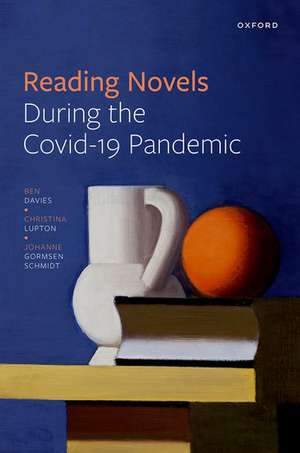Reading Novels During the Covid-19 Pandemic
Autor Ben Davies, Christina Lupton, Johanne Gormsen Schmidten Limba Engleză Hardback – 17 noi 2022
Preț: 473.71 lei
Preț vechi: 654.85 lei
-28% Nou
Puncte Express: 711
Preț estimativ în valută:
90.64€ • 94.64$ • 75.02£
90.64€ • 94.64$ • 75.02£
Carte disponibilă
Livrare economică 04-10 martie
Livrare express 01-07 martie pentru 113.67 lei
Preluare comenzi: 021 569.72.76
Specificații
ISBN-13: 9780192857682
ISBN-10: 0192857681
Pagini: 224
Dimensiuni: 163 x 241 x 19 mm
Greutate: 0.5 kg
Editura: OUP OXFORD
Colecția OUP Oxford
Locul publicării:Oxford, United Kingdom
ISBN-10: 0192857681
Pagini: 224
Dimensiuni: 163 x 241 x 19 mm
Greutate: 0.5 kg
Editura: OUP OXFORD
Colecția OUP Oxford
Locul publicării:Oxford, United Kingdom
Recenzii
This brilliantly written and meticulously researched book makes a major new contribution to literary studies. It demonstrates the value and importance of sociological approaches to reading in expanding the methods of the discipline and enabling new evidence-based insights into how lay readers read. It combines this with a sensitivity to text and temporality, narrative and nuance, that surely cannot but be approved of by even the most stalwart defenders of traditional literary critical methods.
How did the pandemic change our relationship to books? This eagerly awaited study does a deep dive into the role of literature in a time of crisis, looking closely at what and how people read in 2020 and 2021 as well as the times and places in which they picked up a book. The results are fascinating, revealing, and often unexpected
Did anyone actually spend the pandemic reading Proust? Find out in this intimate and revealing account of all the ways books kept us company during a time of almost unbearable isolation
This is an extremely important book, mixing literary theory with qualitative and quantitive data in an innovative way in order to understand how and what we read during the pandemic, and what this means. It provides a vital insight into the life of literature during a crisis
Overall, the book is a very timely contribution to discussions surrounding the seismic cultural and societal shifts triggered-or merely made visible-by the pandemic. The authors are well aware that their sample can shed light only on a slice of the reading public, but through their in-depth interviews and careful curation of the responses, we are treated to fascinating insights about readers and reading during the pandemic. Readers of the monograph will certainly think back to their own pandemic reading practices (and perhaps glance at their pandemic reading diaries?) as they peruse the pages of this tome.
Reading Novels During the Covid-19 Pandemic is an expansive, theoretically suggestive, and very engaging exploration of literature during an unprecedented global crisis. It presents multifaceted perspectives on the complexity of finding time for reading amid a global crisis. Above all, the volume contributes significantly to the fields of literary sociology and ethnography as well as criticism.
How did the pandemic change our relationship to books? This eagerly awaited study does a deep dive into the role of literature in a time of crisis, looking closely at what and how people read in 2020 and 2021 as well as the times and places in which they picked up a book. The results are fascinating, revealing, and often unexpected
Did anyone actually spend the pandemic reading Proust? Find out in this intimate and revealing account of all the ways books kept us company during a time of almost unbearable isolation
This is an extremely important book, mixing literary theory with qualitative and quantitive data in an innovative way in order to understand how and what we read during the pandemic, and what this means. It provides a vital insight into the life of literature during a crisis
Overall, the book is a very timely contribution to discussions surrounding the seismic cultural and societal shifts triggered-or merely made visible-by the pandemic. The authors are well aware that their sample can shed light only on a slice of the reading public, but through their in-depth interviews and careful curation of the responses, we are treated to fascinating insights about readers and reading during the pandemic. Readers of the monograph will certainly think back to their own pandemic reading practices (and perhaps glance at their pandemic reading diaries?) as they peruse the pages of this tome.
Reading Novels During the Covid-19 Pandemic is an expansive, theoretically suggestive, and very engaging exploration of literature during an unprecedented global crisis. It presents multifaceted perspectives on the complexity of finding time for reading amid a global crisis. Above all, the volume contributes significantly to the fields of literary sociology and ethnography as well as criticism.
Notă biografică
Ben Davies is Senior Lecturer in English Literature at the University of Portsmouth. He is the author of Sex, Time, and Space in Contemporary Fiction (2016); editor of John Burnside: Contemporary Critical Perspectives (2020); and co-editor of Sex, Gender and Time in Fiction and Culture (2011). He has also published articles in journals such as Textual Practice and Critique: Studies in Contemporary Fiction.Christina Lupton is a professor at the University of Warwick and the University of Copenhagen. She is author of three monographs: Knowing Books (2012), Reading and the Making of Time (2018), and Love and the Novel: Life After Reading (2022), and numerous articles on the topics of reading, time use, and the materiality of books.Johanne Gormsen Schmidt holds a PhD in literature from University of Southern Denmark and is currently a postdoc at the University of Copenhagen. She is the author of several pieces in the fields of literary sociology, comparative and Scandinavian literature, and uses of literature. She is editor of the literary journal Passage.
